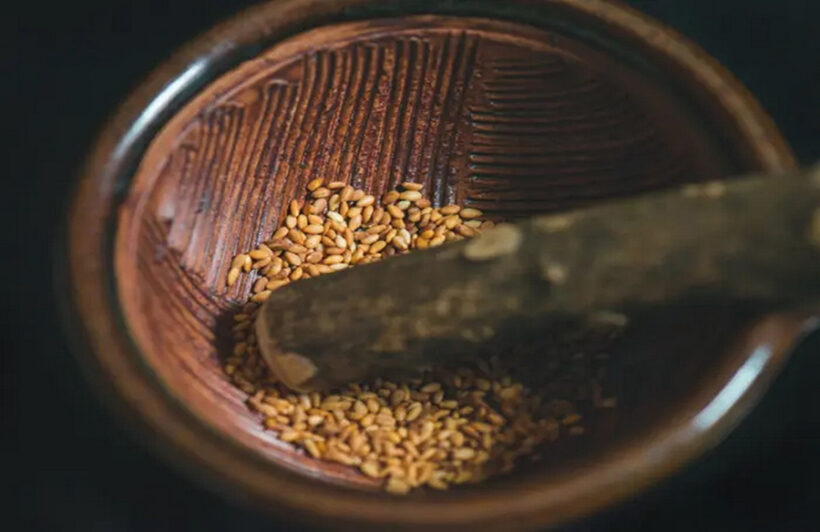Sesame seeds, often overlooked in their tiny stature, hold a rich history of culinary and medicinal significance spanning centuries. These unassuming seeds boast not only a delightful crunch but also a treasure trove of nutrients, rendering them a beloved addition to cuisines worldwide. In this comprehensive exploration, we delve into the multifaceted realm of sesame seeds, encompassing their origins, nutritional composition, health benefits, culinary versatility, types, procurement, storage guidelines, as well as precautions and potential side effects.
Unveiling Sesame Seeds: Origins and Varieties
Sesame seeds, derived from the sesame plant (Sesamum indicum), are renowned for their diminutive size and distinctive nutty flavor. Available in an array of hues, including white, black, and brown, each variant of sesame seeds offers its own unique culinary applications, enriching dishes with its characteristic taste and texture.
Nutrient Profile: A Closer Look
Despite their modest dimensions, sesame seeds pack a powerful nutritional punch. A mere one-ounce (28g) serving of sesame seeds boasts an impressive array of essential nutrients, including protein, fiber, healthy fats, and an assortment of vital minerals such as calcium, iron, magnesium, and phosphorus. These nutritional attributes underscore the significance of sesame seeds as a wholesome dietary component with diverse health-enhancing properties.
Harnessing Health Benefits: A Holistic Perspective
The consumption of sesame seeds is associated with an array of health benefits, owing to their rich nutritional composition. From promoting heart health and supporting bone density to aiding digestion and exerting antioxidant effects, sesame seeds exert a multifaceted influence on overall well-being. Additionally, their potential role in blood sugar regulation underscores their utility as a valuable dietary inclusion for individuals navigating metabolic health concerns.
Exploring Culinary Horizons: Versatile Applications
Sesame seeds serve as versatile culinary companions, infusing dishes with their nutty flavor and satisfying crunch. From the ubiquitous sesame oil, utilized for cooking, flavoring, and finishing touches, to the creamy indulgence of tahini, sesame seeds lend their distinct essence to a myriad of culinary creations. Whether adorning salads, enriching baked goods, or embellishing savory delicacies, sesame seeds offer boundless opportunities for culinary exploration.
Diverse Varieties: A Spectrum of Flavors
The spectrum of sesame seed varieties encompasses white, black, and brown variants, each distinguished by its unique flavor profile and culinary utility. While white sesame seeds are prized for their mildness and versatility, black sesame seeds impart intense nuttiness, ideal for desserts and garnishes. Brown sesame seeds, with their nutty essence tinged with a hint of bitterness, find favor in Middle Eastern and Mediterranean cuisines, adding depth to diverse culinary creations.
Procurement and Storage: Best Practices
When procuring sesame seeds, opting for whole seeds over pre-ground varieties ensures superior flavor and freshness. A discerning eye for quality, characterized by a pleasant nutty aroma and the absence of rancid odors, guides prudent selection. For optimal preservation, storing sesame seeds in an airtight container in a cool, dark environment ensures the retention of their freshness for an extended period, typically up to six months.
Precautions and Potential Side Effects: A Balanced Approach
While sesame seeds are generally safe for consumption, certain individuals may experience allergies or digestive sensitivity. Those with sesame allergies should exercise caution and avoid sesame seeds and related products to prevent adverse reactions. Additionally, mindful consumption is advised, as excessive intake of sesame seeds may induce digestive discomfort in susceptible individuals. Furthermore, the oxalate content of sesame seeds necessitates moderation to mitigate the risk of kidney stone formation in vulnerable populations.
Addressing FAQs: Clarifying Common Queries
Addressing prevalent inquiries surrounding sesame seeds, we affirm their suitability for gluten-free diets and their general safety for consumption during pregnancy, contingent upon personalized medical advice. Furthermore, the potential role of sesame seeds in weight management is elucidated, alongside practical tips for incorporating sesame oil into culinary endeavors. Lastly, we dispel misconceptions regarding the comparative nutritional value of black and white sesame seeds, affirming their comparable nutritional merits.
Embracing Sesame Seeds: A Call to Action
In summary, sesame seeds emerge as nutritional powerhouses, enriching culinary creations with their distinctive flavor and nutritional bounty. Whether as a garnish, condiment, or cooking ingredient, sesame seeds offer a versatile canvas for culinary innovation while bestowing a myriad of health benefits upon discerning consumers. Embrace the goodness of sesame seeds and embark on a culinary journey infused with flavor, nutrition, and boundless gastronomic delight.










